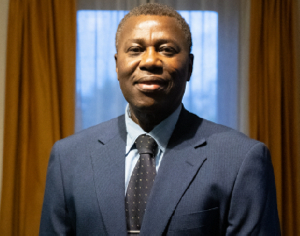Osagyefo Dr Kwame Nkrumah will be turning restlessly in his grave by now as he looks at the leaders who have succeeded him. He will be asking how leaders could be so visionless as to allow his beloved country to sink this low as far as Electric Power production and supply is concerned.
Ghanaian governments after Nkrumah have not taken the nations’ energy as one of their top priorities. We over-relied on the Akosombo which is dictated by nature and thought that as the country grows and expands the same Akosombo could cater for us. Simple elementary economics teaches us that as we add more variable inputs on a fixed input, diminishing return sets in eventually. And I assume our leaders know this very well.
Our leaders have allowed the situation to get to this level and since the current NDC administration took over from 2009, the situation has gone beyond description and still our leaders remain clueless as to what to do to rectify the situation. They have resorted to lip service to solve the problem with promise after promise yielding no results.
Companies have been forced to close down and workers laid off, people cannot do any meaningful work or plan effectively so people are becoming poorer by the day. Hmmm!
Why do we really vote for leaders? Do we vote for the fun of it or that we expect the people we vote to solve our problems on our behalves? Why can we not, as a people, hold our leaders accountable? It is easily done in other places. Nothing, absolutely nothing, seems to be working in the country called Ghana.
Whereas it is good idea for the President to want to fix the crisis once and for all, we cannot wait for all the companies to go down before the solution is found. As a matter of urgency, the government should put short term measures in place to curb the situation while waiting for whatever long term solution there may be.
To worsen the situation, the Mahama led administration has refused blatantly to reduce fuel prices in Ghana even though fuel prices have gone down drastically in the world market. This would have alleviated the plight of the people because these days almost everybody uses generators to produce anything. How insensitive can a caring government be?
The administration should be responsive by importing energy from other countries and buying more fuel to power the various generators that are idling around. They should listen to the genuine concerns of the people and stop tagging everyone who complains as being used by the opposition for regime change. After all, people voted for you so that you can implement policies to better their lives so if their lives are getting worse, don’t they have the right to tell you so?
At times I wonder if President Mahama and his team have sound economic foundations. We all know that energy is the fuel or the life blood to enable us produce whatever we want to produce. When factories are operating at 10% capacity or even closing down and sacking people, thereby increasing the prices of their goods and services, the President is talking about good outlook for 2017.
In the next three years, there are going to be serious multiplier effects of whatever is going on now so let no one deceive themselves that things will be normal soon.
It is better to be late than never so Mr. President please suspend every other project that you are pursuing now and channel all the resources into solving the energy crisis because the energy is the backbone of the economy. (No energy, no production, no employment, no taxes, no growth and the cycle continues)
The economy is collapsing at an alarming rate and the earlier the authorities do something about it the better it will be for us. We should not wait till the economy grinds to a total halt.
My advice to the government is that if we can generate at least 400 kilowatts in the immediate term, the problem will ease for us to propel our economy to enhance productivity and GDP.
GORDON NEWLOVE ASAMOAH
A Public Policy Analyst and Social Commentator
Opinions of Wednesday, 13 May 2015
Columnist: Asamoah, Gordon














